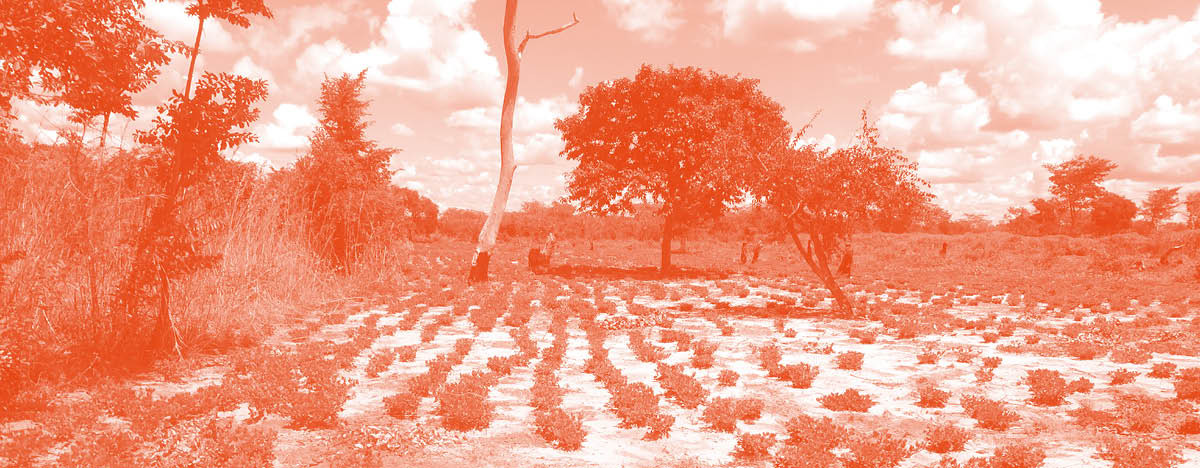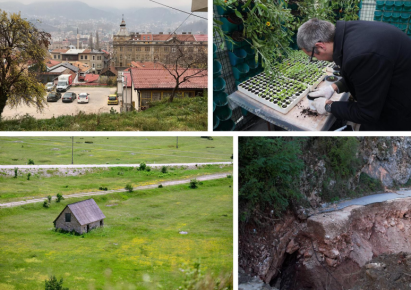Helping people adapt to a changing environment
Published: Jun 4, 2020 Reading time: 5 minutes Share: Share an articleClimate change mitigation and adaptation are among PIN’s top priorities, both in terms of projects that focus on addressing specific aspects of climate change and in terms of mainstreaming climate change within our other priority areas. We design and implement our projects in line with the UN’s Sustainable Development Goals - not only "Climate change action" but also "affordable and clean energy", "clean water and sanitation", "sustainable cities and communities", "responsible production and consumption", "life below water", "life on land" and more.

Root causes of the problem
Climate change presents one of the greatest challenges to humanity today, and it already affects every aspect of our lives. The most severe impacts are droughts or extreme weather events, causing crop failures, lack of access to water and the direct endangerment of human health. The degree of exposure to these threats is not equal; rural populations in developing countries who directly depend on the environment are most affected, compared to urban dwellers. Helping the poorest adapt to the impacts of climate change is therefore both a moral obligation for us and one of the most efficient ways to lift them from poverty, prevent forced displacement and safeguard sustainable livelihoods and a more equitable global society.
Poor people around the globe typically have no choice when it comes to the energy sources they use- whether that be diesel aggregators for electricity production, wood unsustainably chopped from local forests to use for cooking and heating in isolated communities, or low quality coal used in stoves in cities. The homes of these people are often energy inefficient, in terms of heating, cooling, or both, which leads to the excessive use of fossil fuels and contributes to dangerous levels of air pollution.
This problem is further aggravated by the fact that poor people usually have no financial reserves, and renewable energy technologies typically require an upfront investment (the savings then occur only in the operational phase over time). Poor people also tend to mistrust renewable energy technologies and the relatively fast return of their investment.
Solutions
We believe that the most efficient way of solving the above-mentioned root causes is by an integrated and multi-sectoral approach, including interventions designed for the particular needs of the given community.
You can learn more about our approach to climate-related projects in our strategy on Climate Smart Energy Solutions and Climate Resilient Productive Landscapes.
You can read more about some of our climate-related projects here:
Sustainable access to energy products and services for households and businesses in Cambodia
6.9 million Cambodians are without grid access, and people in rural areas tend to pay up to four times more for electricity compared to urban dwellers. To address these problems in a sustainable way, PIN has been strengthening the functioning of rural energy markets. The ‘Developing Sustainable, Market-Driven Biogas and Solar Energy Solutions for Rural Communities’ project in Cambodia facilitated access to renewable sources of energy for more than 38,000 villagers and contributed to a cumulative reduction of 236,276 tons of CO2 (annually). This has involved improving the supply and marketing capacities of suppliers, increasing distribution channels in remote ‘last-mile’ areas, strengthening the provision of after sales services, and promoting the sale and usage of new and innovative products (e.g. flood-proof and easily installable plastic biodigester models).
Strengthening climate resilience through off-grid renewable energy in the Philippines
In the Northern Samar province of the Philippines, nearly 40 percent of households are not connected to the grid, and in mountainous areas, electricity use rates are lower than 20 percent. The area has the highest poverty rate in the region and is highly vulnerable to natural disasters. PIN’s ‘Renewable Energy Access for off-grid Communities and Households’ (REACH) project is working to enhance access to disaster-resilient renewable energy solutions. This is being done through promoting innovative off-grid technologies for households and rural businesses, supporting access to finance, and increasing the demand for renewable energy sources. The ongoing project aims to enable access to disaster-resilient energy solutions for 1875 households and 275 businesses.
Addressing air pollution through improved energy efficiency in Mongolia
In Mongolia, poorer urban residents cannot afford imported insulation materials or modern energy-powered heating, and resort to using inefficient and polluting coal-fired stoves. PINs ‘Sheep Wool Building Materials’ project developed sustainable supply chains for locally sourced, environmentally-friendly sheep wool insulation. This was done through targeted support to pastoralist producers and SMEs, establishing national product standards, and supporting value chain actors to improve demand for their products. The project contributed to sheep wool insulation covering 52,500 square metres of housing space. The Switch Off Air Pollution (SOAP) project, implemented in partnership with GERES, aims to reduce coal consumption in Ulaanbaatar’s Ger area through coordinated action in the field of energy efficiency during housing construction. The project’s aim is to improve awareness, provide advisory and financial services to households, and strengthen commercial supply chains.
Air Quality map of Mongolia (click on the circles to see air quality in certain areas):
Improving access to biogas technologies in Sri Lanka
PIN has worked to create an enabling environment for the large-scale dissemination of biogas as a reliable source of clean energy for SMEs and households in Sri Lanka. The project played an instrumental role in establishing the Lanka Biogas Association (LBA) and initiating and facilitating the development of national biogas standards. The project strengthened biogas-related services (design, construction, after-sales services, appliances) amongst 67 SMEs, supported 4 financial institutions to develop loan schemes to support the construction of biogas units, enabled more than 1000 households and 35 hotels to adopt biodigesters, and contributed to a reduction of emissions of over 2504 tons of CO2 per year. Households and businesses now have an effective waste disposal solution that provides them with a clean source of energy.
The mechanism of a biogas unit:
Natural Resource Management in Ethiopia
In Ethiopia, PIN promotes a holistic Natural Resource Management (NRM) approach to allow communities of the target kebeles to actively implement long-term measures for the rehabilitation and protection of communal and individually-managed lands, and to enable the sustainable development of the livelihoods of local households.
Promoting climate-change adaptation in Cambodia
In Cambodia, we’re using Disaster Risk Reduction (DRR) strategies to enhance communities’ climate resilience. In 2013, PIN Cambodia developed a user-centered alert tool, the Early Warning System (EWS) 1294, to deliver advance warnings in areas prone to natural disasters. Using sophisticated hazard-detection technology, data storage tools and warning-dissemination software, the system sends voice-based alerts and instructions to registered users when the threat of storm, flood, fire or disease outbreak is detected.



